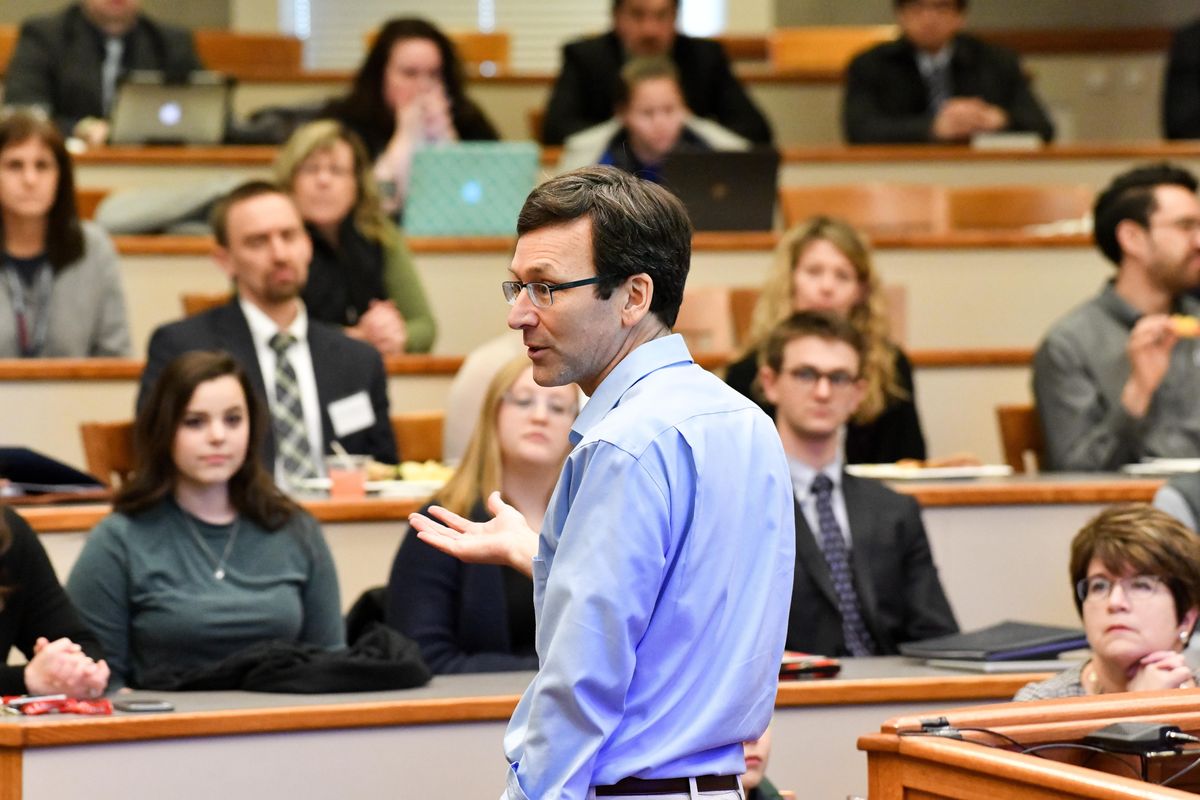Washington Attorney General Bob Ferguson talks smoking age, marijuana, guns and Donald Trump in podcast

Washington Attorney General Bob Ferguson said Friday he is confident a multiyear effort to raise the legal smoking age to 21 would be successful in 2019.
“I never want to declare victory, spike the ball before you’re in the end zone,” said Ferguson in a wide-ranging interview recorded for The Spokesman-Review’s Newsmakers podcast on Friday. “But we feel very, very good about our chances right now.”
The state House of Representatives approved the bill in a 66-30 vote Wednesday, which would increase the age to buy traditional tobacco and vaping products from 18 to 21. Ferguson, first elected as the state’s chief legal officer in 2012, has backed similar legislation each year since 2015, arguing it will save lives while establishing consistency in age requirements for all intoxicating substances sold within the state.
“You’ve got to be 21 to buy alcohol. You’ve got to be 21 to buy marijuana,” Ferguson said. “I see no one proposing those to 18. I get the idea that it’s hard to know what the right age is. But the impacts of teenagers getting addicted to cigarettes, to vaping, are massive for them individually, and for our communities at large.”

While arguing that tobacco companies shouldn’t sell products to people under the age of 21, Ferguson has defended the state’s legal marijuana market against perceived threats from federal authorities. After then-U.S. Attorney General Jeff Sessions announced the decision last January to rescind a Justice Department memo that effectively shielded the state industry from prosecution, Ferguson publicly mulled legal action.
The state attorney general said Friday that Sessions’ departure from the White House lessened that threat, for now.
“With him gone from that position, it gives me a bit more comfort,” Ferguson said. “But we’re very vigilant in paying attention to what the administration’s doing.”
Ferguson noted that Sessions’ replacement, William Barr, is far less outspoken on the issue of marijuana legalization than his predecessor and that Barr’s “hands are a little full right now,” an apparent reference to the potential release of special investigator Robert Mueller’s report probing Russian meddling in the 2016 election. But he said his office would likely reach out to Barr, as it had to Sessions, to talk about the state’s legal marijuana market and how it functions.
Ferguson, like Gov. Jay Inslee, has become more public in challenging actions coming from the White House during the Donald Trump administration, including the ban on travel from countries with a large Muslim population and several lawsuits challenging the administration’s decisions on environmental regulations.
“The way I look at my job, with the administration, is not to swing at every pitch,” Ferguson said. “The way I look at my job, is to swing at pitches when Washingtonians are harmed and we have good legal arguments.”
That hasn’t yet included a multistate lawsuit filed after Trump announced a national emergency last week in an effort to fund a physical barrier at the southern border. Ferguson said he believes the president isn’t on firm legal footing in declaring the emergency, but hasn’t joined the lawsuit because it would be difficult to prove direct harm to Washington residents.
“I think there’s strong legal arguments to challenge it,” Ferguson said. “But it’s not clear yet, the administration hasn’t identified what budgets, what funds from around the country they’re essentially going to raid to build the wall.”
After the podcast interview, Ferguson’s office released a statement indicating it would legally challenge an action from the Trump administration barring taxpayer-supported family planning clinics from referring women for abortions. The policy is known as the “gag rule” and faces likely legal challenges from supporters of access to abortion services.
Ferguson also pushed back on the county sheriffs in Washington state who’ve stated their intention not to enforce a citizen-passed initiative that raised the age to buy guns and created new storage and background check requirements. Those sheriffs should enforce the law that passed by a majority vote of the people, Ferguson said, and lobby their lawmakers or file lawsuits if they believe the law conflicts with gun ownership rights.
“I’m deeply concerned that many local law enforcement officials have simply said, ‘I’m just not going to follow that. I, personally, think that’s unconstitutional,’ ” Ferguson said. “Look, frankly, that is not the role of local law enforcement, to determine constitutionality. That’s the role of the courts.”
With Inslee eying a potential presidential bid in 2020, Ferguson’s name has been floated as a potential successor in the governor’s mansion. But the attorney general said Friday he’s waiting to see what Inslee will do and remains focused on his job as attorney general.
“If at some point down the road, he decides not to make a run for that third time as governor, I’d make that decision,” Ferguson said of the possibility.
The entire conversation with the attorney general can be heard on The Spokesman-Review’s Newsmakers podcast at spokesman.com/podcasts.